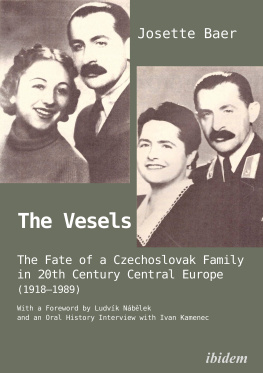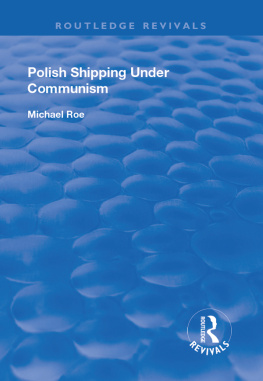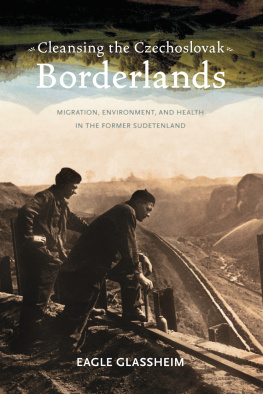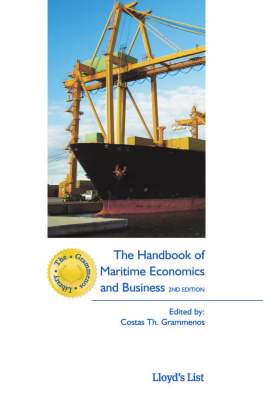Acknowledgement s
In February 2015 when I completed this book, five years had passed since the day I recorded the first oral history interview with a former se a farer. Sixteen other interviews followed. Two of the men I talked to in 2010 are no longer alive. I am grateful to all the men who shared their stories about their seafarer ' s life and about Czechoslovak naval ships with me . These interviews would not have been possible without r e search support for ex ploring the theme of shipp ing in Czechosl o vakia using the oral history method. For this support I am particularly grateful to Professor Miroslav Vank, head of the Centre of Oral His tory at the Institute of Contem porary History of the Czech Academy of Sc i ence s .
In order t o give a n as most complete picture as possible of shipping in Czechoslovakia, however, I needed to conduct deep archi val r e search. Archivist, who are sometimes seen merely as " no name " people , in all the relevant archives ( Security Services Archive ; Archive of the Czech National Bank; Archive of the Ministry of Foreign Affairs) gave me i m portant su p port in my research effort, and I am thankful to all of them. I am most grateful to the National Archive where the majority of the do c uments on shipping are stored, namely the archivist Bohumr Brom, who was very helpful in searching for materials about shipping and making them available for my work. I should not forget Milosla va Burinkov at the National A r chive who prepared excellent tea for me whenever my throat was bur n ing from the dust of the documents.
I am very much obliged to Max Jakob Horstmann, whom I met as a re p resentative of the publisher and who believed that I could write a pu b lishable book in English. I am also thankful for the invaluable support in language e d iting of the text provided by rka Csaov and Jan Kletvk from the Language Department of the Czech Academy of Sciences. Further reading, focusing on language, content , and formal shortco m ings of the final text was carried out by Veronika Pehe from U niversity College London , to whom I also owe my immense thanks .
I am particularly grateful to Pavel Mcke from the Centre of Oral Hist o ry at the Institute of Con temporary History of the Czech Academy of Sc i ence s , for proofreading the text and providing me with comments and useful suggestions before submitting this book to the publisher. Not only did he support me during the work, he also encouraged me at critical moments when I thought I could not complete the project successfully. My work would not have been possible without the institutional support of the Grant Agency of the Czech Republic, contributed within the r e search grant Reg. No . 315130, " Micro-histories " and " Macro-history " of Czech/ Czechoslovak Travelling and Tourism (19451989).
Last but not least, I want to thank my dearest family, my husband Ji Krtk and my daughter Tereza Krtk, for their understanding when I felt tired because of writing this book about Czechoslovak shipping and for their encouragement when I was losing energy.
Intro duction: Maritime busi ness in lan d locked Czechoslovakia as a research topic
This book seeks to address the topic of ocean shipping, seafarers , and ocean ships in socialist Czechoslovakia (19481989), while also exa m ining the processes that allowed Czechoslovak ships to cruise the oceans and for seafarers to live and work on them. Although this topic may seem rather specific and marginal in a landlocked country, seafa r ing in those times was a matter of pride for Czechoslovaks, especially for those men sailing the seas. Their families shared this pride but they often exper i enced loneliness when men set off for their work on a ship for long months. As hardly anybody was allowed to travel in socialist Czechoslovakia, many people envied seafarers their work and their o p portunities to travel freely around the world, obtain foreign (Western) currency and buy goods perceived as luxurious and inaccessible. But envy was aroused not only because of travelling and money. It was also the exception al nature of the seafarers ' job, the sense of something di s tant, adven turous, and exotic. Looking closely at seafarers ' lives, their destinies and memories, we get a completely different picture of the m o tivation behind their sea cruises a profound love of the sea.
Initially, this book was supposed to portray the personal and professio n al life of Czechoslovak seafarers so that they would not sink into obliv i on. This was mainly because the former Czechoslovak fleet no longer exists approximately a decade after the Velvet Revolution , se a farers lost their ships and along the way, many of them lost their purpose in life. However, centring this book on seafarers only would involve two dangers. First, it is impossible to write about seafarers without reflecting on the company they worked for and the role of the state during the s o cial ist period, when private enterprises were excluded from the econ o my. Second, building up the book (only) around the seafarers ' memories could overwhelm the reader with the sadness and nostalgia that these men often i n dulge in when speaking or writing about their past spent on the sea. Thus, approaching this topic only through memoirs could lead to biased and oversimplified conclusions similar to those that are today presented by seafarers themselves or by the media. T he most frequent comments include, for instance, that they worked for a prosperous co m pany, worked hard and thus could be p roud of their work and ships, of that Viktor Koen , with the help of government officials, stole their ships and were it not for him, they would be sailing the ships successfu l ly to this day.
As we will see throughout the book, these voices are generally right; neve r theless, the issue becom es more complicated when covering the topic of maritime business in Czechoslovakia before 1989 in its entirety and co l ourfulness. The following essential questions arise: Why did a landlocked country establish this kind of maritime business? Whom did this bus i ness serve? Who profited from it? For what purposes was the business operated? Was it really prosperous throughout its e x istence? And how did " ordinary " people live within this business? Did they profit from it? Did they like it? Answering these questions will fill gap in knowledge about the Czech o slovak fleet and maritime business.
The book is framed by two main milestones 1948 and 1989. The year 1948 is perceived as the year when the changes initiated after WWII were completed, with the February communist coup d ' tat on the top. It was the moment of reversal in Czechoslovakia when ownership rel a tions changed completely, together with business conditions and instit u tional structure. Consequently, the transport sector changed too. The " real " history of the post-WWII seafaring trade began shortly after the New Year in 1950. The other milestone was the year 1989 when Czechoslovakia became a democracy and market economy. The polit i cal, ec o nom ic, and social changes in the post-November period affected the fu r ther development (and subsequent termination) of the maritime business in Czechoslovakia (the Czech Republic respectively) so fu n damentally that they would require an ind e pendent research project.
The book takes into account three interrelated factors: 1) the develo p ment of maritime business in Czechoslovakia and of the Czechoslovak Ocean Shi p ping company; 2) the circumstances of the Cold War; and 3) the internal political and economic situation in Czechoslovakia infl u enced by the wider political context due to its affiliation to one side of the bilateral conflict. These factors represent the " macro " perspective of the book and reflect the shipping company ' s activities in the political and economic sphere of the socialist state and its planned economy. Along with the macro perspective, this book also offers a " micro " perspective aimed at everyday life on ships, and at the pros and cons of the seafa r ers ' job s . Last but not least, the picture of shipping would not be co m plete without " memories " of the ships run by the Czechosl o vak/Czech Ocean Shipping company.










